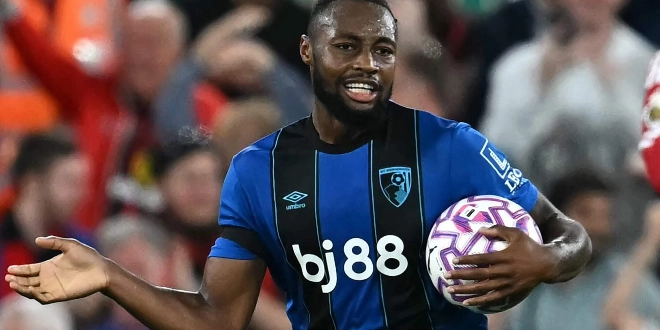A Liverpool man has been banned from every football stadium in the United Kingdom after allegedly directing racist abuse at Bournemouth forward Antoine Semenyo during the Premier League opener at Anfield.
The incident occurred on Friday during Bournemouth’s season opener against Liverpool. In the 29th minute, referee Anthony Taylor halted play after Semenyo reported the abuse to match officials. A fan was quickly ejected from the stadium, highlighting the seriousness with which authorities and the Premier League continue to treat such offenses.
Semenyo, who went on to score twice in the second half, played a crucial role in Bournemouth’s comeback attempt, bringing the visitors level from two goals down before Liverpool ultimately secured a 4–2 victory.
Police Action and Bail Conditions
Merseyside Police confirmed that a 47-year-old man from Liverpool was arrested the following day on suspicion of a racially aggravated public order offence. He has since been released on bail under strict conditions.
The suspect is prohibited from attending any regulated football match across the UK and cannot come within one mile of any football ground while investigations continue. Police have emphasized that their inquiry into the matter remains ongoing.
Semenyo’s Response and Football’s Solidarity
In a statement shared on social media, the 25-year-old Ghanaian international reflected on the support he received following the incident.
“Last night at Anfield will stay with me forever – not because of one person’s words, but because of how the entire football family stood together,” Semenyo wrote. He went on to thank his Bournemouth teammates, Liverpool players, and supporters for their unity, as well as Premier League officials for handling the situation “professionally.”
Wider Context
The case adds to growing concern about racial abuse in football, an issue that has continued to cast a shadow over the sport despite ongoing campaigns and tougher sanctions. In recent seasons, the Premier League, clubs, and governing bodies have worked closely with law enforcement to ensure perpetrators face significant consequences, including stadium bans and criminal charges.
For Semenyo, the focus now shifts back to football, but his words underline the importance of collective action in driving racism out of the game.
 The Daily Star Ireland
The Daily Star Ireland

